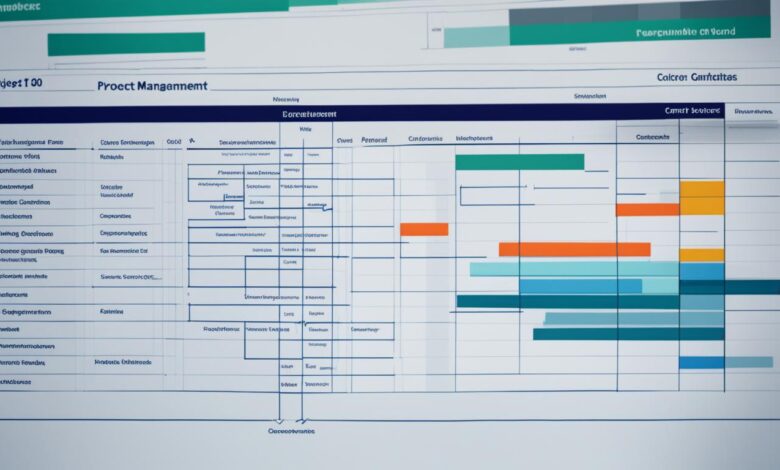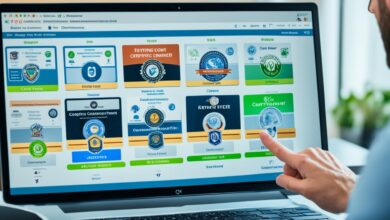Mastering Project Management for Success

Did you know that 70% of projects fail to meet their goals because of bad project management?
Being good at project management is really important. It can help any project succeed. Whether you’re working with a small team or on a big business project, having these skills matters. With good project management, you can finish projects on time and within budget.
This guide is here to help you learn about project management. We’ll talk about many topics, from different ways to manage projects to being a better leader. Understanding communication, organization, and risk management are key too. This guide will give you the tools you need to be a great project manager.
The Importance of Mastering Project Management Skills
Learning project management is key. It brings order and success to achieving business goals. It’s vital, whether you manage small teams or big projects, to make sure things run smoothly.
“The role of a project manager is to not only deliver projects on time and within budget but also to ensure that they meet the desired outcomes and provide value to stakeholders.” – John Smith, Project Management Expert
Good project managers know how to handle the whole project process. They lead teams well, use proven methods, and track progress to keep everything on course.
They use their skills at every step of a project’s life:
- They start projects by setting clear goals, scope, and what needs to be done.
- They plan projects by making detailed plans, figuring out tasks, what resources are needed, and setting deadlines.
- They run projects by assigning resources, dealing with risks, and making sure things are moving along as they should.
- They watch over projects by keeping an eye on important data, solving problems, and making sure the plan is followed.
- They end projects by checking the results, learning from the experience, and handing over what they’ve done.
By getting good at project management, you can tackle the technical and people sides of a team project. This means knowing the right methods, best practices, and getting everyone to work together well.
Benefits of Mastering Project Management Skills
- Improved Efficiency: A well-executed project follows a clear plan and timeline. This uses resources well and finishes on time.
- Enhanced Collaboration: Good project management makes for better teamwork and communication. Team members can work together smoothly towards the project’s goal.
- Minimized Risks: Skilled project leaders can spot and lessen risks, making project problems less likely to happen.
- Informed Decision Making: By looking at project data, project managers can make smart changes to do better and get the results they want.
- Increased Stakeholder Satisfaction: Projects that are well-managed make everyone happy. They see their goals achieved and value the work done.
By always improving your project management skills, you make yourself a key player in managing successful projects. This leads to growth for your team and company.
Understanding Project Management Methodologies
Project management methodologies are like guidebooks for successfully finishing projects. They show project managers how to plan, execute, and monitor project tasks. This helps make sure projects finish on time, within budget, and meet quality expectations.
Several project management methodologies are used nowadays. Let’s look at some of the top ones:
Waterfall Methodology
The Waterfall methodology works step by step. Each project phase is done before starting the next. It’s good for projects with clear requirements and where changes won’t happen much.
Agile Methodology
Agile is all about being flexible and working together. It allows for changes during the project and focuses on improving as it goes. Agile divides projects into short, focused times called sprints for quick progress and feedback.
Scrum Methodology
Scrum is a part of Agile, great for complex software projects. It uses teamwork in short, focused periods to deliver parts of the project. Scrum encourages teams to improve continuously and work closely together.
Kanban Methodology
Kanban is about making work easy to see and track. It helps manage how much work is being done at once and keeps work flowing smoothly. Kanban works well for teams with changing workloads and emphasizes seeing progress in real-time.
Many times project managers mix methods to fit their project’s unique needs. This can lead to a better project outcome by using the best of each method.
Knowing about different project management methods is key for project managers. It helps them pick the right method and run their projects well. With the right method, project managers can boost their team’s work together and ensure success.
Mastering Communication in Project Management
Good communication is key to project management success. As a project manager, talking often and clearly with your team and stakeholders is very important. It’s not just about giving news. It’s about making sure everyone understands, listens, and is clear. Project management communication means more than talking; it’s about understanding each other too.
Staying in touch is vital to keep everyone focused. This way, everyone knows what’s expected of them. When you communicate openly, it makes your team feel ready and supported to do their best.
Being a great project manager means being good at talking. Keep it simple. Stay away from any technical talk that might confuse. Say things in a way your team will understand.
Listening is also very important and not talked about enough. Listen well to what your team says. This helps you find and fix any problems before they get big. Listening also builds trust, which is a must for any project to work.
“Good communication is the bridge between confusion and clarity.” – Nat Turner
Don’t forget that talking is a two-way street. Make sure your team feels free to share what they think. Also, watch how they act. Sometimes you can learn a lot by noticing these things.
Want to be even better at talking as a project manager? Try showing your ideas with pictures or charts. This can make hard ideas easier to understand. Also, use tools like project management software. They can make talking and sharing information a lot smoother.
Key Points to Remember for Project Management Communication:
- Communicate frequently, purposefully, and effectively
- Ensure regular and open communication with your team and stakeholders
- Be clear, concise, and tailored in your messages
- Practice active listening and empathy
- Promote a collaborative and inclusive communication environment
- Utilize visual aids and project management tools to enhance communication
By becoming a communication expert in project management, you can lead strong teams. You can also get stakeholders more involved and lead projects to success.
Excelling at Organization and Planning
Being organized and planning well are critical in project management. Project managers lead in making sure goals are met effectively. They do this by organizing details, dividing tasks smartly, setting up a clear plan, and using the right tools.
Starting with a solid understanding of the project needs is key. Knowing what the project aims to achieve, its limits, and what it should produce help set the path for success. Project managers also look at who’s involved, pick important stages, and link the plan to the big strategy.
After setting the project’s goals, it’s time to split the work into parts. This helps in giving out roles, using resources well, and making sure every task is done. This also makes it easier to see how things are going and fix any problems quickly.
Good planning means breaking down what needs to be done and seeing how it all connects. This way, the project goes smoothly and without many holdups. Thinking about the order of tasks lets managers make plans that work and handle risks better.
Tools like Gantt charts and risk checklists are really useful. Gantt charts show the project’s steps visually, helping track time, resources, and avoid clashes. Risk checklists help spot and deal with problems early, making sure bad surprises are few.
Project managers really need to be great at staying organized and planning. By paying attention to the project’s needs, dividing the work thoughtfully, and using the right tools, they can boost their skills. This helps in reaching the project’s goals.
Key Takeaways:
- Thoroughly detailing project requirements is crucial for effective planning.
- Breaking initiatives into logical workstreams allows for efficient resource allocation and progress tracking.
- Defining activities and dependencies ensures a logical sequence of tasks.
- Utilizing tools like Gantt charts and risk registers enhances project planning.
- Excelling at organization and planning drives successful project outcomes.
Building Leadership and Team Skills in Project Management
Being a strong leader is key to success in managing projects. Project managers lead teams, push work forward, and make sure projects finish on time. With good leadership, they make a place where teams can work well together and produce amazing results.
It’s important for project managers to motivate and trust their team. They should know what each team member is good at and what they need to improve. They then assign jobs based on these insights. Trusting team members to do their best work makes them feel responsible and dedicated. This boosts their productivity and the quality of their work.
Leaders must change how they lead depending on the project’s needs. For example, they might have to be more bossy or democratic. Adapting their style helps deal with project hurdles and lead their teams to victory.
Project managers need to build trust with their team. When team members trust their leader, they are more open to talking, asking for help, and facing big challenges. Sticking to clear, fair decisions and being responsible for their choices helps build this trust. This trust helps everyone feel supported, encouraged, and ready to do their best.
“Leadership is not about being in charge. It is about taking care of those in your charge.” – Simon Sinek
In summary, good project management leadership really matters. By focusing on teamwork, empowering team members, adjusting leadership styles, and building trust, project managers can bring out the best in their team. This leads to remarkable project success.
Leveraging Data and Managing Risks in Project Management
Data and risk management are key for project success. Project managers use project data to make smart choices. They also handle risks to make each project the best it can be. This includes using data to tell a project’s story and show its value.
It’s important for project managers to watch over critical data in a project. This data could be about the budget, the schedule, or how resources are used. Looking closely at this data helps them spot problems early. They can then fix them quickly, improving how the project goes.
Managing risks well means finding and dealing with threats before they hurt the project. By examining risks closely, project managers can plan for the worst and come up with ways to avoid problems. This kind of planning keeps the project moving forward, even when surprises come up.
Project managers also use tools like dashboards and burn-down charts to see and share risks. These visuals make it easy to understand where a project stands. They find problem areas fast and help project managers make the right moves. This way, everyone knows what’s happening with the project and can help if it’s needed.
Key Points:
- Watch important project data to steer well and decide clearly.
- Look deeply into risks to stop troubles before they start.
- Use charts and dashboards to make risks clear and keep the project on track.
- Tackle risks head-on to please everyone involved.
Putting project data and risk management first helps project managers handle tough times. This makes projects more likely to succeed in the end.
Key Project Management Roles and Responsibilities
Project managers are key to project success. They handle many tasks from start to finish. Knowing their roles well is crucial for a great project management performance.
Initiating Projects:
- Identifying project opportunities and aligning them with organizational goals
- Gathering project requirements and defining project objectives
- Conducting feasibility studies and creating business cases
Planning Projects:
- Developing detailed project plans, including timelines, budgets, and resource allocation
- Defining project scope and deliverables
- Creating risk management plans and mitigation strategies
Executing Projects:
- Managing project teams and assigning tasks
- Monitoring project progress and ensuring adherence to project plans
- Facilitating communication between team members and stakeholders
Monitoring Projects:
- Tracking project performance and identifying deviations from plans
- Implementing corrective actions to address issues and risks
- Conducting regular project status meetings and reporting on project progress
Closing Projects:
- Conducting project evaluations and capturing lessons learned
- Ensuring project deliverables are met and signed off by stakeholders
- Finalizing project documentation and archiving project files
Project managers need strong communication and problem-solving skills. Leadership is important too. By excelling in their roles, they can lead project success and help companies grow.
Example of Project Management Roles and Responsibilities:
“A project manager starts by gathering requirements and aligning them with goals. Then they plan the project by making schedules, budgets, and risk management plans. In execution, they manage the team, ensuring good communication. They continuously check the project, take corrective measures, and close by evaluating with stakeholders.” – John Smith, Project Manager at XYZ Company
The Importance of Project Manager Responsibilities:
Project manager duties are crucial for project completion. By doing their work well, managers make sure projects happen on time and within budget. Their skills in leadership and management help the team work together and reach success.
Essential Project Management Skills
Project managers need more than just technical knowledge. They must also have key soft skills. These skills include good communication, leadership, and being well-organized. They must also know how to use data and handle risks. Improving in these areas helps project managers succeed.
The Power of Communication
Being able to communicate well is very important for project managers. It means making sure everyone knows the project goals and deadlines clearly. Good communication makes teamwork smoother and helps solve problems quickly. Project managers must be good at talking to different people and groups. They need to adjust their style to each one.
Leadership that Inspires
Strong leadership helps project teams work better. Project managers should encourage their team to do their best. This builds trust and teamwork. They should set clear goals, give feedback, and find ways to use everyone’s skills.
Organization and Efficiency
Being good at organizing things is a big part of a project manager’s job. They must plan everything well, set realistic timelines, and use resources wisely. This makes big tasks easier to handle. Plus, it helps the team know what to do and when.
Leveraging Data for Informed Decision-making
Data is key for good project management. Managers need to collect and look at data to stay on top of how the project is going. They can use tools like charts and graphs to show the project’s status clearly. This helps them make smart choices based on data.
Risk Management for Success
Dealing with risks is a natural part of being a project manager. It’s about looking ahead, finding possible problems, and planning how to avoid them. Managing risks well can prevent big issues and make the project more likely to succeed.
To be great at their job, project managers need both technical and soft skills. These include communicating well, leading effectively, staying organized, and using data smartly. By developing these skills, project managers can make a bigger difference. They can lead their projects to success and achieve great things.
Conclusion
Project management is always about learning and getting better. With the right info, skills, and tactics, managers can handle tough parts of projects and do well.
It’s key to know basics of project management and keep up with new ways. Using good tactics like clear talks, detailed plans, and handling risks early can up your project’s success.
Project managing isn’t just about the tech side. It’s also about making a good team and being a strong leader. Building trust, working together, and always learning builds a team’s power and helps them do great work.
Success in project management comes from info, skills, and team play. By sticking to this guide and using good project management ideas, managers can beat tough times and win in their projects.








